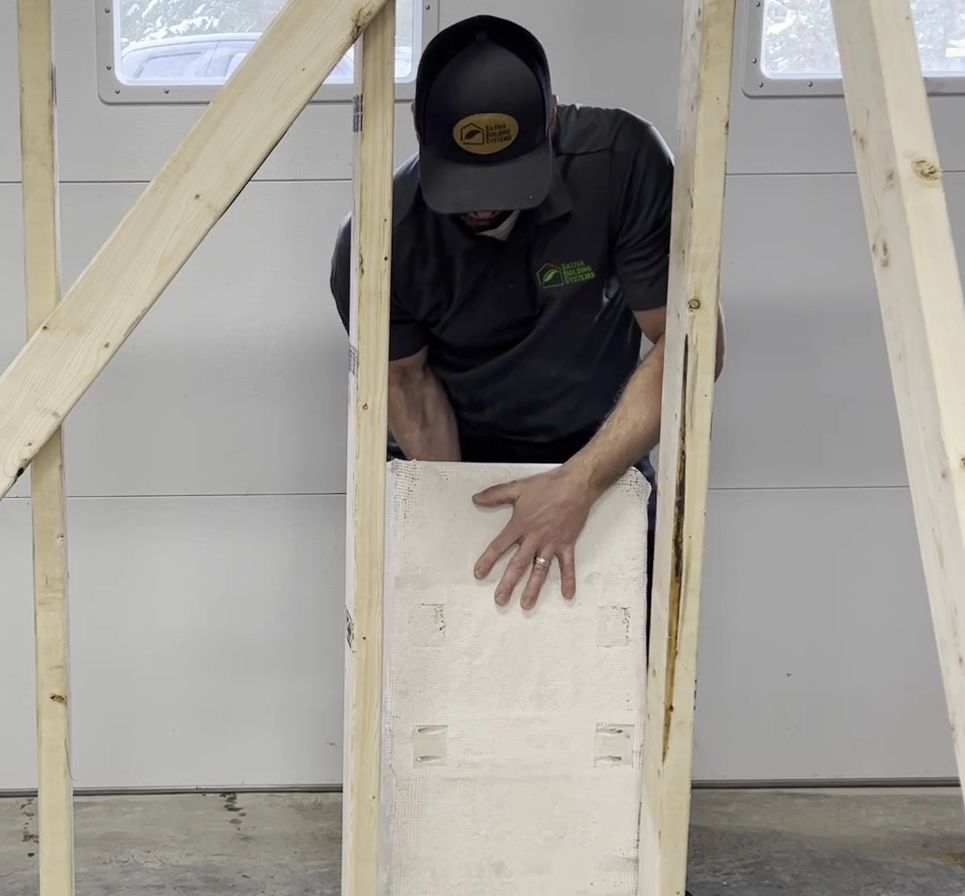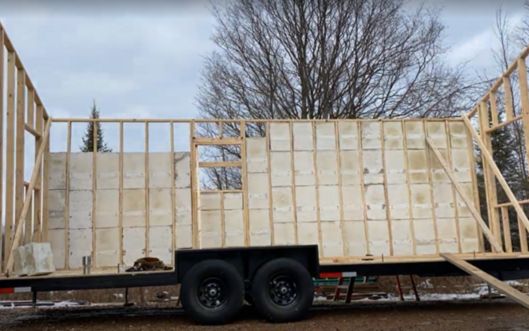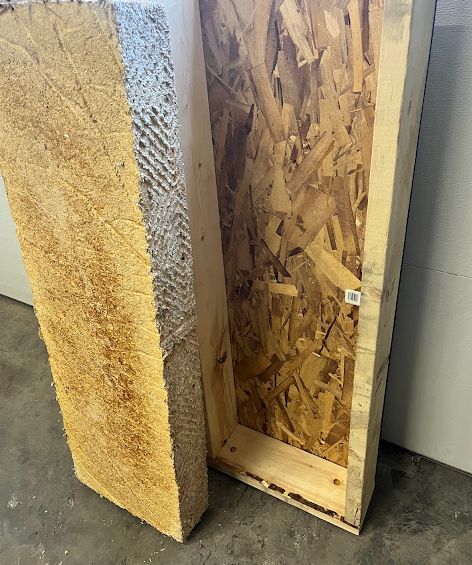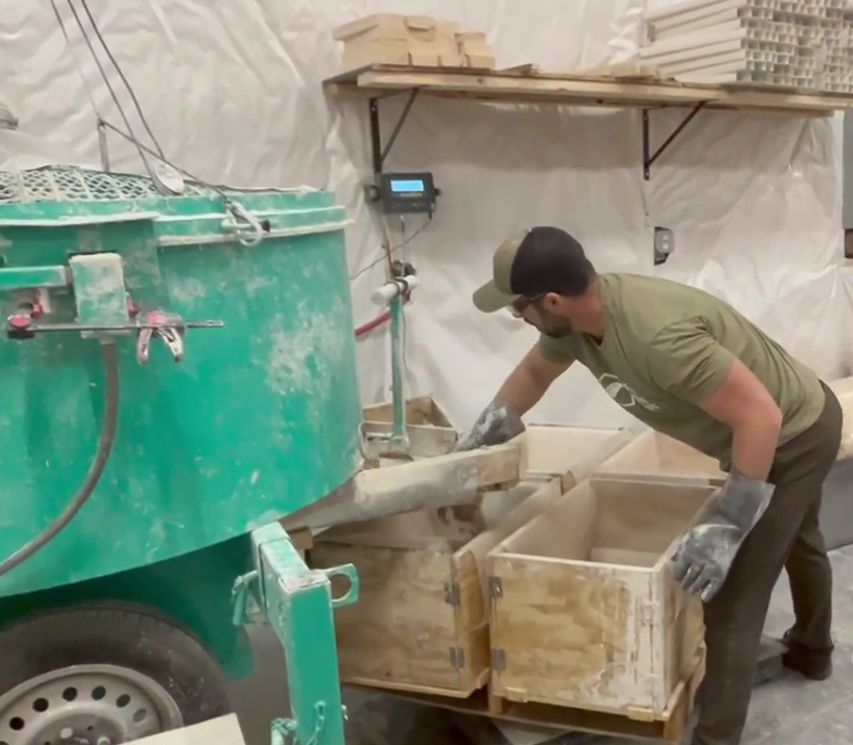Fifteen years ago, Zach Popp, founder and president of Sativa Building Systems, began looking into sustainable alternative building materials after his infant daughter fell ill for an entire winter due to black mold in her bedroom wall. With no professional scientific research experience, he capitalized on his expertise and years of experience in construction as he began researching and experimenting at home. His efforts eventually led to securing over $2 million in federal funding.
“I discovered that in Europe a material called hempcrete was gaining popularity, and it really checked all the boxes as superior building material,” said Popp. “It was non-toxic, mold-resistant, fire-resistant, and rot-resistant.”
After experimenting with various hempcrete mixtures and building with hempcrete on his property, Popp recognized an opportunity to make hempcrete into a precast block panel. Z Panels, as Popp calls them, speed up construction and are more viable for the US market. Popp’s company Sativa Building Systems eventually patented the Z panel, which is produced in central Wisconsin. This product is the first hempcrete product in the US with an ICC-ESR code compliance report on file, said Popp.
“Our SBIR research was inspired by recognizing that while hempcrete is an amazing material, it’s not an ideal insulation material for every application in buildings, specifically in ceilings and floors,” said Popp. “It’s great for walls, but it’s just too heavy to be practical in other applications. So, I thought about an alternative binder for hemp, something that would be lighter than hydrated lime, and realized that mushroom mycelium could be a good option.”

The hemp-mycelium building material Popp has developed is a self-assembling biopolymer using an edible mushroom. The material must be prepared and grown in a relatively sterile and controlled environment since there are many opportunities for contamination, slow growth, and failed samples. With no experience in mycology, Popp has consulted with expert mycologist Dr. John Holliday.
In 2023 Popp won a $223,375 SBIR Phase I from the Army after he applied for a topic focused on sustainable building materials. The initial Phase I focused on prototyping and compared the physical attributes of his hempcrete material to a hemp-mycelium material, which has many unknowns. Popp found that hemp-mycelium in comparison to hempcrete not only has a comparable compressive strength, but a significantly superior wood adhesion strength. With a 47% better thermal insulation value and only a third of the weight of hempcrete, hemp-mycelium offers significant advantages. It is promising for in-field use as well because it cuts easily with less dust and is lightweight and easy to handle, said Popp.

Popp is working to solve inadequate safety and durability of conventional building materials. Many conventional homebuilding materials are at risk of mold and VOC off gassing. Fiberglass batts and foam board insulation, the two most common wall insulation materials, also pose health risks. Fiberglass frequently suffers from thermal drift and loses its R-Value over time and rigid Foam has no vapor permeability and is usually not fire-resistant, said Popp.
“We simply believe that we can make better insulation materials that do not suffer from these deficiencies, while using fully non-toxic, bio-based materials,” said Popp.
The Department of Defense agrees. In 2024, the Army awarded Popp a $1,899,893 SBIR Phase II to continue to develop his product and perform research. Popp consulted with Stonegardens Advisory to assist in securing DoD support. During Phase II, Popp has so far consulted with structural engineers to evaluate materials, as well as individuals with manufacturing expertise help refine production processes. Specifically, Popp plans to evaluate hemp-mycelium fire resistance, fungal-resistance, and acoustic properties. In the Phase II project, Popp is working on the development of two products: a hemp-mycelium insulation batt as a replacement for fiberglass batts, and a hemp-mycelium “Z Panel” which has the same shape and functionality as his current hempcrete Z Panel but is made from hemp-mycelium.
“The reason for exploring two products is because I like to play what I call the long game and the short game,” said Popp. “The short game is when you make a product that is a simple replacement to what is already currently used and accepted in the market. A hemp-mycelium batt would replace the current fiberglass batts. The long game is making a market disrupting product that is a significant divergence from what is currently typical in the market. The long game has more potential, but as expected, it takes time.”
Popp is also looking to solve supply chain challenges in the building materials industry. Making a self-assembling biopolymer provides the opportunity to integrate the supply chain more vertically and bring affordable materials to the market, said Popp.

“Socio-political events in recent years have shown how fragile supply chains are, and we believe you can partially solve this problem by focusing on localized supply chains,” said Popp. “We like hemp because it can be grown in all 50 states, and it has some impressive agricultural and physical attributes. So, if we make hemp the foundation for our products, we open the door for communities to grow their own building materials. This could ultimately allow us to bring down the cost of building materials and buildings overall.”
Popp was a participant in the Center for Technology of Commercialization’s free Lean Startup course as well as their SBIR Advance program.
Accomplishments with Wisconsin CTC:
- SBIR Advance Phase I & II
- Lean Startup Program
“Often when putting together a proposal for SBIR funds it’s difficult to anticipate every single expense that could come up during the completion of a project,” said Popp. “The SBIR Advance matching grant has allowed us to pursue intellectual property protection, perform thorough market research, expand workforce training, and just generally help advance mission and vision of our company.”
The Center for Technology Commercialization supports innovators across Wisconsin in pursuing technology development appropriate for the SBIR/STTR program. To sign up for CTC’s free consulting and programming click HERE.
